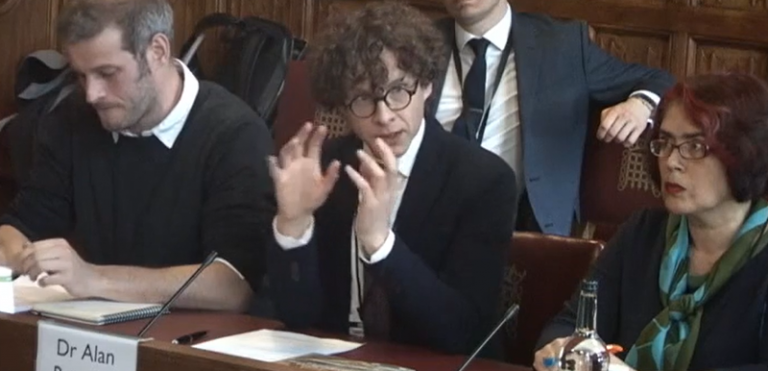Lords committee endorses Alan Renwick’s proposals to improve democratic information
29 June 2020
A major report by a House of Lords committee has today fully endorsed proposals made by Unit Deputy Director Dr Alan Renwick on ways of improving the information available to voters during elections.

The House of Lords Select Committee on Democracy and Digital Technologies has today published a detailed report on Digital Technology and the Resurrection of Trust. The report addresses the challenges posed to democracy by the shift in political communications from print and broadcasting to online media. It recommends a wide range of counter-measures, including an enforceable code of practice for political advertising, modernisation of electoral law, and substantial investment in digital media literacy.
Dr Renwick gave both oral and written evidence to the committee in March, the latter submitted jointly with Joe Mitchell (then of Democracy Club) and former Unit researcher Michela Palese. These built on his 2019 report, co-authored with Michela Palese, on Doing Democracy Better: How Can Information and Discourse in Election and Referendum Campaigns in the UK Be Improved? Their core proposal was the development of an independent ‘democratic information hub’ to help voters access key information, particularly at election times.
The committee’s report summarises this proposal (paragraph 254):
“Dr Alan Renwick, Joe Mitchell and Michela Palese recommended the establishment of a ‘democratic information hub’. The hub would establish a coordinated brand that voters could trust, with ready pathways to different forms of information so that they can easily find what they need. The hub’s work would be overseen by a board of directors and a representative panel of citizens. It would be publicly funded and, the authors suggest, cost-neutral, as it could divert funding from the delivery of polling station addresses. The authors made the point that public funding to support information is widespread in other democracies, including Ireland, Germany and Canada. The hub would coordinate the aggregation and creation of information content that voters require. This could include making information produced by others more accessible, with information published by the Institute for Fiscal Studies and the Office for Budget Responsibility cited as examples.
It then endorses the proposal fully (paragraphs 256–7):
“We consider the proposal for a democratic information hub to be thoroughly sensible and believe that a new source is required to centralise and make information about democracy available to voters. This source must be independent and politically neutral.
The hub would have two purposes: the first and most important would be to inform the public. The hub could provide ‘basic’ information about democracy, including how to vote, where to vote and who the local candidates are for all levels of elections. It could then build its services up gradually once it had gained some brand recognition and achieved a trusted status. The second purpose would be to bring together and inform policymakers, government of all levels and civil society organisations. For this audience, the hub would act as a centre for innovation, research and promotion for what works in digital engagement. The hub could connect policymakers to access and better understand the successful digital innovations taking place in civil society.
It concludes by recommending the proposal’s implementation (paragraph 258):
“The Government should establish an independent democratic information hub. This would be both a public-facing hub that provides information about democracy, starting with basic information about democratic procedures, and a means of sharing best practice in digital democracy between policymakers and civil society organisations.
Reacting to the report, Dr Renwick said:
“The Lords committee has done excellent work, both in analysing the problems posed to democracy by the rise of digital technologies, and in setting out a range of detailed, practical solutions. I am particularly glad that it argues not just for tackling misinformation, but also for ensuring that voters can access high-quality information on elections and referendums. The government is currently developing proposals both for regulation of online harms, and for reform of electoral law, creating a golden opportunity to implement the committee’s recommendations in full.
Key links:
Summary of the oral evidence session, with links to video and transcript
Written evidence by Alan Renwick, Joe Mitchell, and Michela Palese
House of Lords Select Committee on Democracy and Digital Technologies
 Close
Close

